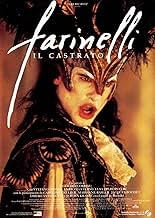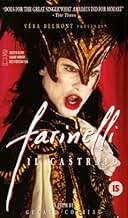IMDb रेटिंग
6.8/10
7.7 हज़ार
आपकी रेटिंग
अपनी भाषा में प्लॉट जोड़ेंThe story of castrato opera singer Carlo Broschi, who enthralled 18th-century European audiences under his stage name Farinelli.The story of castrato opera singer Carlo Broschi, who enthralled 18th-century European audiences under his stage name Farinelli.The story of castrato opera singer Carlo Broschi, who enthralled 18th-century European audiences under his stage name Farinelli.
- 1 ऑस्कर के लिए नामांकित
- 6 जीत और कुल 4 नामांकन
फ़ीचर्ड समीक्षाएं
'Farinelli' is a film well worth seeing for its memorable visual imagery and its unique soundtrack. Mid-film scenes set against the decadence of 17th-century European court life make for charming costumes and sets. Contrasting visuals of rural Italy provide their own pastoral allure that is no less charming. Moreover, the film rises admirably to the daunting technical and artistic task of reproducing the tone of a castrato voice, considering that the musical world has not seen or heard a castrato singer for more than a century.
'Ah,' you say, 'sounds gorgeous...but what's it about?' Enter Carlo and Riccardo Broschi, Italian brothers who share musical aspirations: Riccardo composes, and Carlo sings what he writes. Carlo is a gifted castrato, but Riccardo is a mediocre composer at best. In time, Carlo becomes the renowned Farinelli while Riccardo struggles with his lack of talent/recognition as well as the troublesome fact that Carlo is his meal ticket.
The simple story line masks rich potential (think 'Amadeus'), but 'Farinelli' is hampered by shallow character development and its inexplicable tendency to substitute all-too-frequent sex scenes for emotional power. Without the full realization of the characters or the ramifications of the plot, the film struggles to keep a viewer engaged, at least in my own case. The beautiful pageantry of 'Farinelli' fails to compensate for its hollow dramatic core.
In short? Not bad, but a better music movie is 'Amadeus'(among others), and a better movie with beautiful Italian visuals is 'A Room With A View' (among others).
'Ah,' you say, 'sounds gorgeous...but what's it about?' Enter Carlo and Riccardo Broschi, Italian brothers who share musical aspirations: Riccardo composes, and Carlo sings what he writes. Carlo is a gifted castrato, but Riccardo is a mediocre composer at best. In time, Carlo becomes the renowned Farinelli while Riccardo struggles with his lack of talent/recognition as well as the troublesome fact that Carlo is his meal ticket.
The simple story line masks rich potential (think 'Amadeus'), but 'Farinelli' is hampered by shallow character development and its inexplicable tendency to substitute all-too-frequent sex scenes for emotional power. Without the full realization of the characters or the ramifications of the plot, the film struggles to keep a viewer engaged, at least in my own case. The beautiful pageantry of 'Farinelli' fails to compensate for its hollow dramatic core.
In short? Not bad, but a better music movie is 'Amadeus'(among others), and a better movie with beautiful Italian visuals is 'A Room With A View' (among others).
Famed 18th century (castrato) soprano Ferinelli invites a serious biographical study. This 17-18th c. period was, until recent times, skirted over by musicologists and music history teachers.
The result of this omission has been an unsuspecting awareness of the extent to which male performers dominated all forms of period theater, including opera, oratorio, cantata, ballet, and stage plays. "Ferinneli" had an opportunity to provide substantive information in filling this void.
Unfortunately, what resulted is just another Ken Russell-type production (a la "The Music Lovers," "Lisztomania," "Mahler," etc.). In fact, were Andre Corbiau's name not credited as director of "Ferinelli," one would swear this was a Russell composer biopic.
All Russell trademarks are there: excessive closeups of actors in dramatic distress, swirling activity to cover up script weaknesses, and disjointed highlights instead of sequence continuity.
Director-coscriptor Corbiau has Stefano Dionisi as Ferinneli forever falling down and collapsing both on and offstage for no apparent reason, and using the old device of having him hesitate to sing on cue before a full house to superficially create suspense and anxiety.
In fact, Corbiau, like Russell, is more intent on affecting than expressing: manipulating the viewer than sincerely sharing. As a result, one is held a arm's length of emotional participation throughout.
While no contemporary production can create a truly authentic period setting, there are questions which arise here: George Frederick Handel, one of the world's most prolific and fine composers, is reduced to that of a mere rival theatrical impressario; and Farinelli is forever acting oddly--claiming vocal loss, serious indisposition, and tripping out on opium. Indeed, at times this seems more like a baroque version of sex-drugs-and-rock-'n'roll.
On the brighter side, the staging of the operatic scenes are wonderfully on-target, having been obviously well-researched and meticulously designed. The combination real-and-computer-created vocal work is fascinating in its etherial timbre and in its negotiation of Handelean melismas, embellishments and assorted ornamentation. Likewise, the baroque pit orchestra and period opera house decor is strikingly detailed.
What a pity "Farinelli" fails in its main opportunity: to convey a simple, heart-felt story of one of history's most celebrated singers.
The result of this omission has been an unsuspecting awareness of the extent to which male performers dominated all forms of period theater, including opera, oratorio, cantata, ballet, and stage plays. "Ferinneli" had an opportunity to provide substantive information in filling this void.
Unfortunately, what resulted is just another Ken Russell-type production (a la "The Music Lovers," "Lisztomania," "Mahler," etc.). In fact, were Andre Corbiau's name not credited as director of "Ferinelli," one would swear this was a Russell composer biopic.
All Russell trademarks are there: excessive closeups of actors in dramatic distress, swirling activity to cover up script weaknesses, and disjointed highlights instead of sequence continuity.
Director-coscriptor Corbiau has Stefano Dionisi as Ferinneli forever falling down and collapsing both on and offstage for no apparent reason, and using the old device of having him hesitate to sing on cue before a full house to superficially create suspense and anxiety.
In fact, Corbiau, like Russell, is more intent on affecting than expressing: manipulating the viewer than sincerely sharing. As a result, one is held a arm's length of emotional participation throughout.
While no contemporary production can create a truly authentic period setting, there are questions which arise here: George Frederick Handel, one of the world's most prolific and fine composers, is reduced to that of a mere rival theatrical impressario; and Farinelli is forever acting oddly--claiming vocal loss, serious indisposition, and tripping out on opium. Indeed, at times this seems more like a baroque version of sex-drugs-and-rock-'n'roll.
On the brighter side, the staging of the operatic scenes are wonderfully on-target, having been obviously well-researched and meticulously designed. The combination real-and-computer-created vocal work is fascinating in its etherial timbre and in its negotiation of Handelean melismas, embellishments and assorted ornamentation. Likewise, the baroque pit orchestra and period opera house decor is strikingly detailed.
What a pity "Farinelli" fails in its main opportunity: to convey a simple, heart-felt story of one of history's most celebrated singers.
I know I'm being sort of anal by mentioning this, but this movie, as beautiful and enchanting as it is, has many inaccuracies.
Farinelli, in addition to his handsome features and heavenly voice, was also a very humble person and hardly displayed the raucous behavior of a "rock star" as depicted in the film.
Second, the singer was known as disinterested in sex, thus I have no idea why the sex scenes in the film were included. True, there WERE castrati who did engage in pleasures of the flesh, but Farinelli was NOT one of them, or at least there are no historical records suggesting so.
All that aside, this movie was a lavishly done production and a must-see!
Farinelli, in addition to his handsome features and heavenly voice, was also a very humble person and hardly displayed the raucous behavior of a "rock star" as depicted in the film.
Second, the singer was known as disinterested in sex, thus I have no idea why the sex scenes in the film were included. True, there WERE castrati who did engage in pleasures of the flesh, but Farinelli was NOT one of them, or at least there are no historical records suggesting so.
All that aside, this movie was a lavishly done production and a must-see!
This film was great. Even if the singing looked a little fake at times, and there was a bit too much sex than was really necessary, but a great film, with beautiful music. I thought more emphasis would have been put upon the anguish and degradation Farinelli might have felt, and more stress on the love/hate relationship the public had with the castrati, but definitely a film worth seeing.
This remarkable film remains one of my favourites. The story line at first left me wondering why the director had chosen to make the film in the first place. Luscious scenery, beautiful costumes, sets, extravagant, but historically accurate stagings for the opera scenes, great language and dialogue - but why make a film about an all but forgotten singer from almost three centuries ago? Nothing in the film seemed to give a clue as to why anyone would go to all the bother of reconstructing a marvelous voice so painstakingly, and choose one of the great performers of our time to oversee the performances of the music. Repeated viewings did not seem to throw any light on the vexing question that, despite all the lushness and splendour I was still missing some point to the whole exercise. It was only on the third or fourth viewing that I noticed in the opening credits a small remark - in French - "to the memory of my daughter . . "name"". Suddenly the whole thing made sense. This marvelous and true story of the castrato is, perhaps, the directors attempt to describe his impotence in the face of the loss of his beloved child. Viewed in this light the ending of the film and the sequences in London between Farinelli and Benedict finally begin to have a poignancy and a sadness that is truly stunningly and sensitively achieved whilst adding to the story line. I love this film and cannot possibly recommend it enough. Any lover of Early Music should revel in it, but it has been lifted out of the ordinary and into the universal and sublime by that one small realization. Superlatives cannot do it justice.
क्या आपको पता है
- ट्रिवियाBoth male and female voices were combined to create the sound of Farinelli's singing voice. The male voice was Derek Lee Ragin, a British countertenor and the female Ewa Malas-Godlewska, a Polish mezzo-soprano.
- गूफ़LIGHTING. In scenes that show stage lights and chandeliers, the focus on them is softened, but it can still be seen that the "lamps" and "candles" are in fact far too steady, and too smokeless, to be or to contain live flame. Gaslight was not brought into theatres until just after 1800 (in England), and limelight -- with real quicklime -- around 1820. Also, some outdoor lighting -- outside palaces, etc. -- is obviously too bright, blue- or green-shaded, smokeless, and sharp-edged to come from a bonfire.
- भाव
Carlo Broschi: I admire your nerve, madame, in daring to defy Handel.
Countess Mauer: Women are very strong, signor Farinelli. Men's weaknesses make it necessary.
- कनेक्शनFeatured in The 52nd Annual Golden Globe Awards (1995)
- साउंडट्रैकOmbra fedele anch'io
[Dario's Solo: Act II, Scene XI, from Opera "Idaspe"]
Composed by Riccardo Broschi, Libretto by G.P. Candi and Domenico Lalli (1730, Venice)
Vocals performed by Ewa Malas-Godlewska (Soprano) and Derek Lee Ragin (Countertenor)
टॉप पसंद
रेटिंग देने के लिए साइन-इन करें और वैयक्तिकृत सुझावों के लिए वॉचलिस्ट करें
- How long is Farinelli?Alexa द्वारा संचालित
विवरण
बॉक्स ऑफ़िस
- US और कनाडा में सकल
- $15,73,411
- दुनिया भर में सकल
- $16,00,226
इस पेज में योगदान दें
किसी बदलाव का सुझाव दें या अनुपलब्ध कॉन्टेंट जोड़ें

































